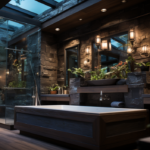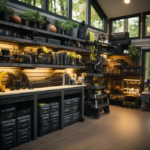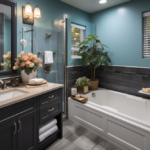Table of Contents
Money-Saving Home Upgrades to Protect Your Wallet in the Long Run
Hey there homeowners! Are you tired of unexpected and costly repairs popping up around your humble abode? We’ve all been there, and trust me, it’s no fun. That’s why today, we’re talking about preventive home improvements that can literally save you thousands of dollars in the long run.
Let’s face it, being a homeowner comes with its fair share of responsibilities and expenses. From leaky roofs to faulty plumbing, it seems like there’s always something demanding our attention and hard-earned money. But what if I told you that taking a proactive approach to home maintenance could significantly reduce the chances of these issues occurring and save you a significant chunk of change?
By making smart home upgrades and taking preventive measures, you can mitigate potential problems before they become costly repairs. We’re not just talking about spending a fortune on fancy gadgets or hiring expensive professionals here. These are simple and practical improvements that any homeowner can tackle themselves – no advanced DIY skills required!
In this article, we will highlight some preventive home improvements that you can easily implement to avoid hefty bills and unexpected headaches. From regular HVAC maintenance and weatherproofing to investing in a sump pump or updating your electrical system, these tips will help you nip potential problems in the bud and keep your hard-earned money where it belongs – in your wallet.
So, if you’re ready to unleash your inner DIY hero and save yourself thousands of dollars in the process, keep reading and get ready to become a master of preventive home maintenance!
Regular HVAC Maintenance: Keep Your System Running Efficiently
Maintaining your HVAC system is crucial for both saving money and ensuring a comfortable living environment. Regular maintenance involves simple tasks like changing filters every few months to prevent clogs and poor airflow. Additionally, scheduling annual inspections and tune-ups can catch any potential issues before they escalate into costly repairs.
Cleaning the condenser and evaporator coils is another essential aspect of HVAC maintenance. Over time, these coils can accumulate dirt and debris, hindering efficient heat exchange. Regular cleaning helps the system work optimally and reduces the risk of breakdowns.
Don’t forget the outdoor unit! It’s essential to keep it clear of any debris or vegetation. Obstructions can block airflow and cause the system to overheat, potentially leading to a malfunction.
Leaky ductwork can also contribute to energy wastage. Inspecting and sealing any leaks helps prevent air loss and makes your HVAC system more efficient. Additionally, insulating ducts in unconditioned spaces (like the basement or attic) helps prevent heat gain in the summer and heat loss in the winter.
By prioritizing regular HVAC maintenance, you can ensure your system operates efficiently, reduces energy consumption, and saves you money on utility bills. So, don’t forget to set reminders and make it a part of your home maintenance routine! Stay tuned for the next section, where we’ll dive into weatherproofing your home for energy efficiency and savings.
Updating Electrical Systems: Enhancing Safety and Preventing Fires
Hey there homeowners! Today, we’re diving into the world of updating electrical systems to enhance safety and prevent potential fires. It might not sound like the most exciting topic, but trust me, it’s crucial for the well-being of your home and your wallet.
First things first, if your home has outdated electrical wiring, it’s time to consider a replacement. Older wiring is more susceptible to wear and tear, increasing the risk of electrical fires. By replacing outdated wiring, you significantly reduce the chances of accidents and ensure a safer living environment.
Upgrading to modern circuit breakers is another essential step in securing your electrical system. Newer circuit breakers are designed to detect excessive electrical currents and quickly shut off the power, preventing overheating and potential fires. Plus, they offer enhanced efficiency, saving you money on energy bills.
Moisture-prone areas like bathrooms and kitchens require extra protection, which is where ground fault circuit interrupters (GFCIs) come into play. GFCIs monitor the electrical current and can detect ground faults or electrical leakage. Installing GFCIs greatly reduces the risk of electrical shocks and ensures a safer environment for you and your family.
Proper grounding is essential for all electrical outlets and appliances in your home. This safety measure redirects electrical faults and prevents potential hazards. So make sure to check that all your electrical components are properly grounded to keep your home safe.
Regular inspections and maintenance of electrical panels and connections are vital to catch any potential issues before they become major problems. Loose connections or frayed wires can be a recipe for disaster, so stay proactive and schedule regular check-ups.
Last but not least, consider installing a whole-house surge protector. Power surges caused by lightning strikes or grid fluctuations can damage your expensive electronics. A whole-house surge protector acts as a shield, safeguarding your gadgets and saving you from costly replacements.
By updating your electrical system and taking these preventive measures, you not only enhance the safety of your home but also save thousands of dollars in potential damages and repairs. Stay tuned for the conclusion, where we’ll recap the key preventive home improvements and their money-saving benefits.
Sump Pump Installation: Prevent Costly Water Damage
Water damage can be a homeowner’s worst nightmare, causing expensive repairs and potential health hazards. One effective preventive measure is installing a sump pump in your basement or crawl space. A sump pump automatically pumps out excess water that accumulates due to heavy rain, floods, or rising water tables. This helps prevent water damage to your home’s structure and belongings.
Additionally, proper drainage around your home is crucial in preventing water buildup and potential flooding. Ensure that the slope of the land directs water away from your foundation, and consider installing downspouts extensions to ensure water is discharged a safe distance away from your home.
Regular maintenance of your gutters and downspouts is also essential. Clear them of debris, such as leaves and sticks, to avoid clogging and ensure proper water flow. This helps prevent water from overflowing and accumulating near your home’s foundation, which can lead to water seepage and damage.
If you have basement windows or window wells, consider installing window wells and covers. This helps keep water out and prevents it from seeping into your basement during heavy rain or flooding.
For added protection, consider installing a backup sump pump or a battery backup system. These systems ensure that your sump pump continues to operate even during power outages, offering peace of mind and protection when you need it most.
By taking preventive measures like installing a sump pump and maintaining proper drainage, you can significantly reduce the risk of costly water damage to your home. Stay tuned for the next section, where we’ll delve into the importance of updating your electrical system for enhanced safety and savings.
Conclusion
In conclusion, homeowners, taking preventive measures and making essential home improvements can save you thousands of dollars in the long run. By being proactive and investing a little time and effort, you can avoid costly repairs and unexpected expenses.
Regular HVAC maintenance, weatherproofing your home, updating your electrical system, and investing in a sump pump are all key preventive measures that can have a significant impact on your wallet. These improvements not only enhance the safety and efficiency of your home but also help you save on energy bills and potential repair costs.
Remember, regular HVAC maintenance keeps your system running smoothly, weatherproofing protects your home from the elements, updating your electrical system enhances safety, and having a sump pump prevents basement flooding. These preventive home improvements are practical, accessible, and can save you a ton of money in the long run.
So, don’t wait for a disaster to strike – start implementing these preventive measures today. Your home and your wallet will thank you!









